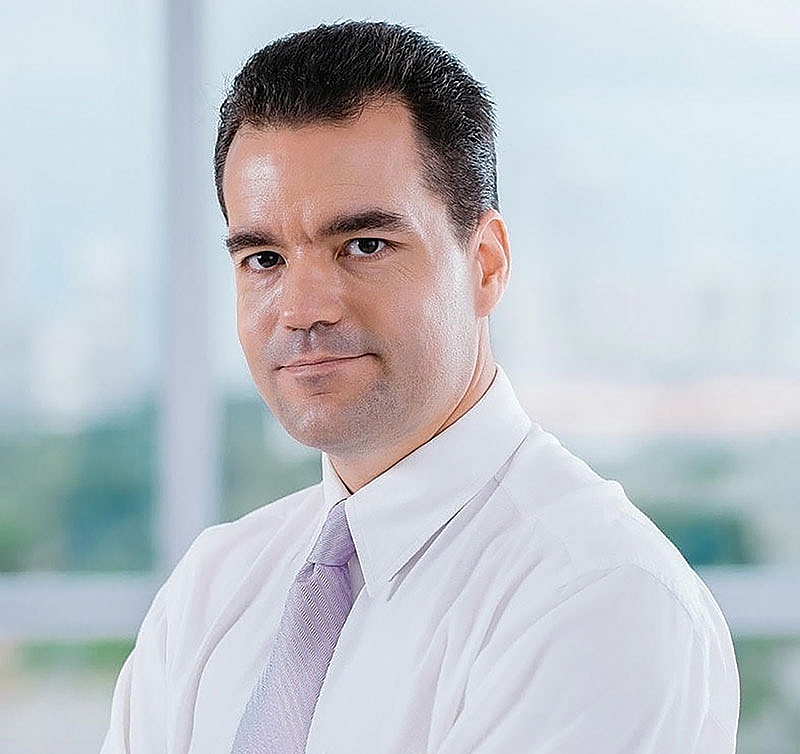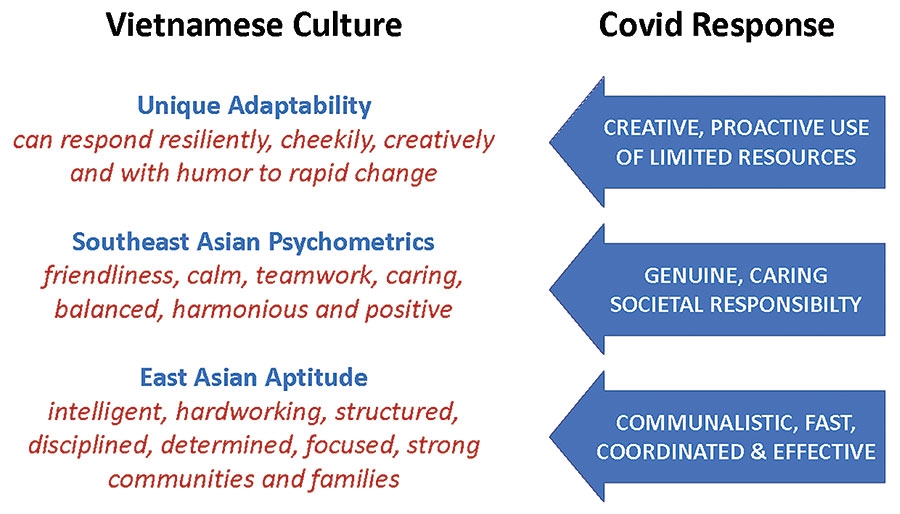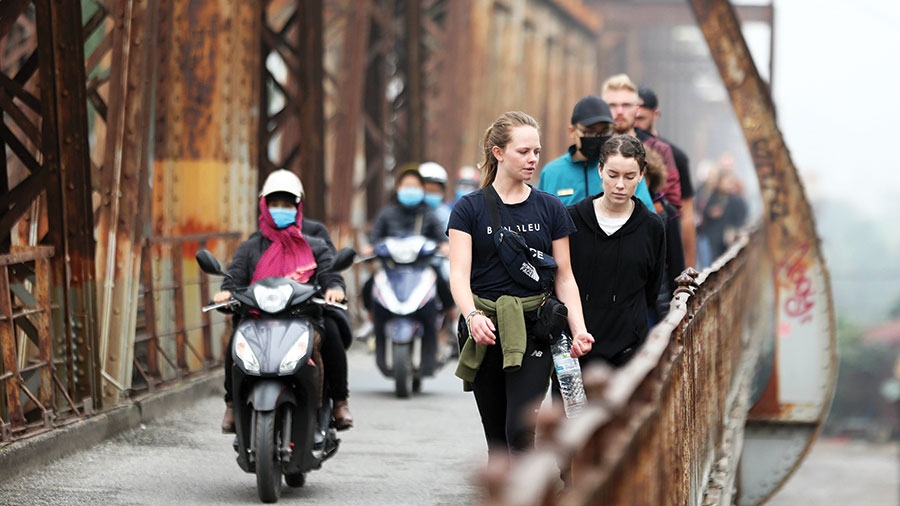Vietnam’s COVID-19 success is thanks to culture
 |
| By Colin Blackwell Chairman HR Committee Vietnam Business Forum |
In theory, the more developed countries had all of the required resources, technology, and plans before the pandemic. The problem was that culture distracted them from deploying those resources effectively enough. In comparison Vietnam, which started on paper at least with less resources, was able to perform far better. Vietnam did so because their cultural approach was more effective in the circumstances.
This is consistent with a broader underlying theme of Eastern pragmatism being more effective than Western ideology. The West has given the world many ideological “-isms” and culturally tends to see this as the centre of everything. Eastern culture factors ideology into a balance, but puts actual results to the forefront. The economic centre of the world has as a consequence returned to Asia.
The pandemic exacerbated and speeded up many underlying trends. The virus does not follow any ideology: it just gets on with it. Hence the best human response to counter this is just getting on with it. This favours pragmatic societies over ideological ones. This is exactly what has happened in reality. It is just as much a reality as the Eastwards shift in the global economy and for the same basic reasons.
The Vietnamese government has been absolutely clear in its responsibilities during the crisis. Of course, it has to track potential transmission, put suspected cases into quarantine, close the borders, and enforce public hygiene. That is the role and responsibility of a government for the benefit of society. They have to make assumptions about people’s levels of self-responsibility and step in where there is a risk. This approach worked exactly as it was meant to, so Vietnam can now enjoy its deserved “competency dividend”.
 |
The Western countries in contrast tripped up on ideological hurdles, which were put before a pragmatic response. Examples of this were inability to close borders for fear of being nationalistic, inability to gather information, or enforce rules for fear of infringing on freedoms. The unfortunate result of this impractical ideology now is far less freedom in reality – for example to travel, meet, or work.
Worse than that, the Western inability to confront the initial medical crisis has had a sad domino effect of becoming in turn an economic, social unrest, political, and mental health crisis. The West could have avoided all of those just as the East has done.
 |
It is rather grim to watch from afar the debates in the Western media about whether lockdowns work. In Vietnam we know the answer – lockdowns either work or they do not. In Vietnam it worked, in the West it did not. It seems too simple to have to say, but it comes down to practical competence, which is driven by culture. Culture is naturally more complex than just the ideological versus pragmatism axis though. On these more complex measures, the story is fortunately even better for Vietnam. Previously I set out my interpretation of Vietnam’s culture (see image). In summary, my theory is that Vietnam has the best of three characteristics; a foundation of East Asian aptitude combined with Southeast Asian psychometrics and crowned by a unique adaptability.
I previously encouraged people to argue with my theory, but the consensus was that it made sense. So in the absence of a better theory, let’s see how the model holds up to what happened during the pandemic.
The foundation layer of “aptitude” proved true enough. The government was clear about their responsibilities and authority, which resulted in a very fast response starting way back in January. The communalistic culture meant that government, businesses, and people all naturally aligned in the same direction. This consistent discipline meant that the virus could find no cracks in Vietnamese society to slip through.
The Southeast Asian psychometrics reinforced the level of social responsibility needed to defeat the virus. People practiced social distancing not only because they were told to, but because they genuinely cared for other people. Although lockdowns are a challenge, in Vietnam it was much less stressful, on account of the natural kindness and good humour everyone had towards each other. People rallied together in a positive way because they were happy to do the right thing.
The pandemic turned upside down many aspects of the business world. Jobs either had to adjust or were lost. In many countries, job losses were severe. In Vietnam, the unique adaptability strengths demonstrated themselves clearly in the fast changes so many companies made. A good example is the garments sector becoming a global leader in masks and personal protective equipment at the beginning of the global crisis.
This combination of cultural and government strengths lead to Vietnam’s pandemic response becoming a world leader. Many expatriates living here were initially apprehensive, but rapidly saw the Vietnamese approach working. Although it was not what they would have done culturally, the expatriates overwhelmingly went along with the approach enthusiastically and with gratitude to their host country. They saw with their own eyes the benefits of a fast pragmatic approach and why it works.
The Vietnamese deserve every credit for achieving everything they have done. That said, the individual people in the West did not deserve the suffering they have endured. As a European living in Vietnam, I have watched as family and friends overseas have had lifestyles impacted, fallen ill, lost jobs and are anxious of what the future holds. One would not wish that on another person and their anger towards their predicaments is understandable.
The light at the end of the tunnel may be that in time, the West may at least give a chance to the concepts of Eastern cultural pragmatism. Or maybe just to consider the option that different cultures lead to different outcomes and that positive change is always possible.
To end on a positive note, credit is also due to the island nations of the Caribbean, which are geographically in the West but were in this instance quite Eastern in their thinking. My brother lives in Barbados and is on the COVID-19 task force there, so I saw some details on their national response. Right from the beginning they looked to the successes in Asia (especially Vietnam) as their benchmark and followed the same strategies.
The result was quite clear, that they successfully stopped community transmission by a pragmatic approach of impassively observing what worked, then just getting on with it – just like Vietnam did.
What the stars mean:
★ Poor ★ ★ Promising ★★★ Good ★★★★ Very good ★★★★★ Exceptional
Related Contents
Latest News
More News
- Vibrant Vietnamese cuisine fit for global tastes (June 09, 2025 | 10:42)
- Vietnam can be global hot spot in 2025 (January 29, 2025 | 00:38)
- Promoting tourism and hospitality with sustainability (January 28, 2025 | 09:00)
- Vietnam centres on eco-luxury tourism and hospitality (January 28, 2025 | 02:06)
- Growth prospects for Vietnam’s event tourism in 2025 (January 28, 2025 | 01:18)
- Core values drive success at Marriott (January 24, 2025 | 16:00)
- Hoteliers to prioritise eco-luxury (January 04, 2025 | 09:00)
- Vietnam upscale tourism on the rise for 2025 (December 30, 2024 | 12:03)
- Addressing concerns can shape green hospitality (December 04, 2024 | 10:24)
- Vietnam’s sports economy to lead a new era of development (November 06, 2024 | 16:31)

 Tag:
Tag:


















 Mobile Version
Mobile Version